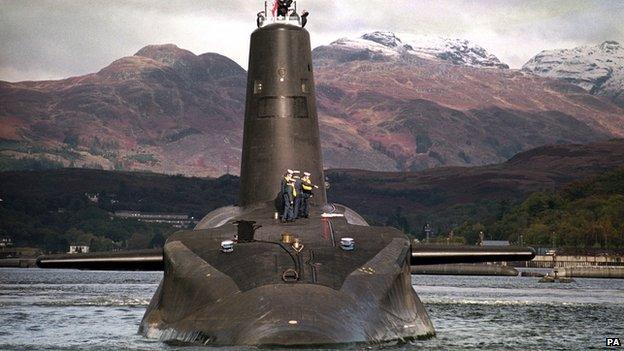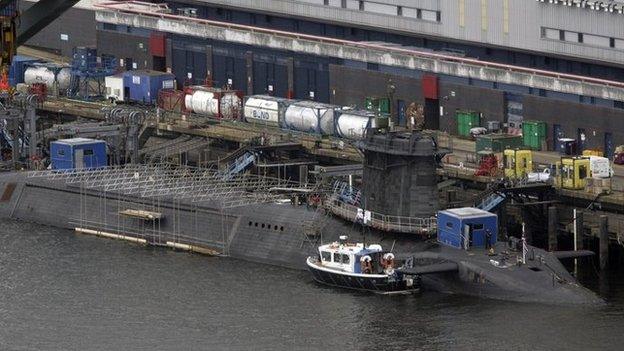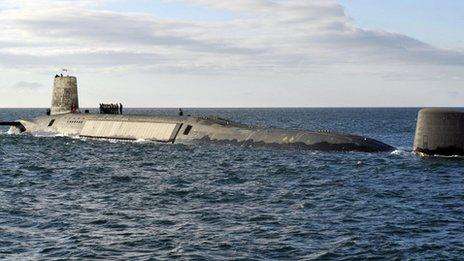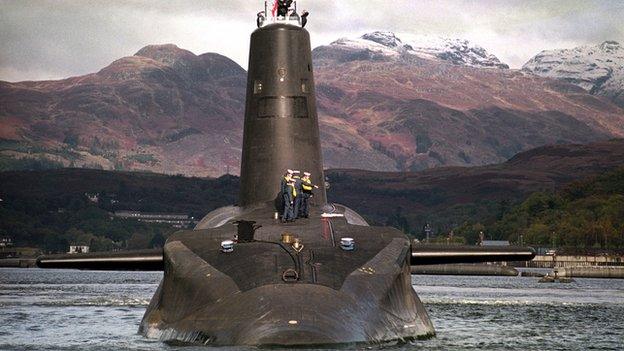Trident question comes to the surface
- Published

The SNP, Plaid Cymru and the Greens want Trident to be scrapped
The loch at Faslane, external is very calm on a beautiful spring-like day, seagulls wheel above the jetty and its short, white radar tower. Beneath the still waters, I presume, lurks some of Britain's ageing nuclear deterrent.
The future of Trident, external may not be much of an issue in the election, but it will be one of the most important, and expensive, decisions, external the new government makes.
And it could be a vital issue in any negotiations if there is a hung Parliament.
There are four submarines, external based at Faslane in Dunbartonshire:
Vanguard
Victorious
Vigilant
Vengeance
One is always armed with nuclear weapons and is at sea on patrol. That is the "continuous-at-sea deterrent", called Operation Relentless.
To me, their names give the game away - the debate about the future of the UK's nuclear weapons isn't just about cost - even though billions are at stake - but posture, pride, and our place in the world.
Four-eyed mermaid
Prof John MacDonald, external, of Scottish Global Forum, suggests Labour faces a dilemma over Trident.
He says: "It is a symbol of power, and there are indeed those who see it as a potent symbol.
"There's long been the sense that to be against Trident, shows that party to be weak on defence.
"I think that position can be easily challenged at this point in time, when you can ask questions about the vigour of the UK's conventional capacity, when you look at fast jets, aerial surveillance, the Royal Navy's fleet.
"I certainly subscribe to the view that there are better ways of spending the UK's defence purse than on Trident."
For some the argument is not about strategy, but morality.
After two very polite Ministry of Defence policemen ask what I'm doing on the beach outside the base, I move on to the peace camp, external.
It is filled with vivid vehicles - there's an orange caravan painted with a four-eyed mermaid and a rather less jokey black vehicle painted with a white mushroom cloud.
I talk to two youngsters whose views don't vary much from those who marched at Aldermaston decades ago, external.
"They have too much power - the power to destroy the world," one says.
"That base up the road has the power of 3,000 Hiroshimas - all that money would be better spend on the NHS, keeping people alive rather than killing them."
That is the standard moral argument against nuclear weapons. Next year we will hear it a lot more - as the subs at Faslane and the missiles on them are nearing the end of their natural life.

In 2016, the new government, whoever it is, will have to decide whether to go ahead with building new submarines - at a cost estimated by former Defence Secretary Liam Fox in 2011 of up to £25bn - and three years after that, decide on plans for a new warhead - about another £6bn. Those are Ministry of Defence estimates - opponents such as CND say the true total cost is nearer £100bn.
Vivien Dance moved to the nearest town to Faslane, Helensburgh, because her husband, Tony. worked on Polaris, external, the system that came before Trident, for 15 years.
She is also an independent councillor, external and says: "Polaris was the start of the nuclear deterrent, and it was what brought us to Faslane. At the time I believe, we believed, that it was the right thing for the country as a deterrent.
"It worked, it did what it set out to do, but now we can move on and review where we are now. I really don't think we need it any more. The nuclear deterrent is not the answer to the defence that we need at the moment."
Bargaining chip
For now, the plan is to replace Trident, like for like. Money has already been spent, and new submarines are already being designed. But the final green or red light for the project - the "main gate" in the jargon - will come next year.
But well before then, Trident's replacement could become a bargaining chip in any negotiations if there's a hung Parliament.
Indeed, the Liberal Democrats insisted on raising the issue anew as part of the last coalition agreement - but the review, external tilted heavily towards the status quo. Now, the party talks about cutting back to maybe two subs - and critically important - not have them on nuclear armed patrol the whole time, external.
An independent think tank close to the Lib Dems recently produced a detailed report, external suggesting it made more sense to base the UK's nukes on warplanes or ground-based missiles.
The Conservative and Labour parties disagree with that. They want something like Trident, external, but it is still an open question whether that means four subs, and some have recommended fewer warheads and missile tubes.

A Trident submarine at the Faslane naval base
In Scotland, Trident played big in the referendum, external, even though opinion polls, external don't show a clear majority against. But the SNP declared if they won they would seek "the speediest safe withdrawal of nuclear weapons from Scotland".
In defeat, their resolution has not faded. The man who leads them at Westminster and is their defence spokesman is Angus Robertson, external.
He told me: "The SNP has consistently opposed this, and if we exercise any influence in a hung Parliament after the election we will be continuing our opposition to a Trident replacement."
Given that Plaid Cymru and the Greens also want to get rid of UK's nuclear weapons, external, this could be a real sticking point. He continued: "The SNP is not going to support the green light for a new generation of nuclear weapons, whether they are based in Scotland, or the UK as a whole. We believe we shouldn't be wasting taxpayers' money on a system that can never be used."
Labour have been committed, like the Conservatives, to a continuous-at-sea deterrent, but last month Ed Miliband said he wanted something much vaguer, external - the "least-cost nuclear deterrent we can have".
I asked a defence spokesman and former Defence Minister Kevan Jones, external if that is Trident. "Yes it is," he said. "It is party policy, it has gone through rigorous policy review, it was endorsed at conference last year, and that is the policy.
"We're in favour of a minimum credible nuclear deterrent based on a continuous-at-sea deterrent."
He was very firm in holding this line - I'd expect a bit of a dustup within the party over this, if they are in power.
Few expect the SNP and Labour to rush into each other's arms ahead of the election. But Trident would be a serious stumbling block in the path of any deal in a hung Parliament.
But the following year, the debate will take on a new urgency.
With constant Nato warnings about a more assertive Russia, the argument could well be between those who say this proves the need for Cold War-style weapons and those who worry this would be at the cost of conventional weaponry that is much more likely to be needed.
And it is a more profound question than many that will be thoroughly aired in the election campaign.
- Published23 May 2017

- Published28 January 2015
